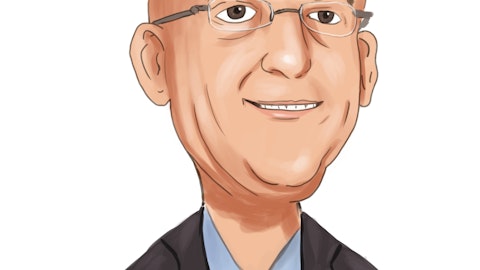But by the time those sites get ready to go. We may have enrolled the trial. Now, there’s a lot of other things we can do. We don’t want to frustrate clinical sites, but I couldn’t — I think I’ve said it before. Maybe I’ve just said it privately. One of the things that frustrates us is that clearly what the FDA is doing is different from what are the other regulatory agencies are doing. All these other countries, their patients are getting access to what we think is a pretty good drug XPro for Alzheimer’s disease. The US patients are sitting on the sidelines because of regulatory challenges both with the FDA. I can promise you the US will be involved in the Phase 3 trial and will probably be the main driver of the Phase 3 trial. But I wouldn’t be surprised if we complete the Phase 2 trial without US patients.
Tom Shrader: Good. If I can follow-up given we have Mark on the line. Mark, in INKmune prostate cancer trial, who are these patients, are they post taxing? And I guess is the trial monotherapy? Then the final question is the oncology world has bent over backwards trying to get prostate cancer to be an INKmune reactive tumor that XTANDI Nevo went on for years. And now it’s Nevo Ap and do you see INKmune playing there that it might be the final piece to make prostate cancer Nevo reactive? Is that interesting to you? Or is this pretty much a monotherapy endeavor for at least a while?
Mark Lowdell: Sure. It’s a really, really excellent question. And I would love to spend a long time of size and put my academic hat on, and so I think with the first question is, yes, these are going to be post tax same patients the end-stage patients because that’s what you always do it get into Phase 1 trial. The question about failure of the checkpoint inhibitors, every immunotherapy that’s been tried in prostate so far has targeted T cell responses and the immune suppressive microenvironment of the tumour is high and whether that be checkpoint inhibitors or whether it be antibody conjugates. [indiscernible] If you look — if you read the literature. And if you go and speak to a histopathologist, they’ll tell you that very few.
If you look at patients who do well in interventional therapy in prostate cancer, their patients who have a large NK cell infiltrate in their tumor there is no association with the T-cell infiltrate. So what we’re targeting ourselves are already in the tumor. We just trying to switch them on to be better like we are in AML and MDS. And we know that the dirty little secret about solid tumors. This thing called neutrophil extracellular traps that coat the tumor and they inhibit NK cell activity. It means the NK cells and the T cells can’t get the tumor, but we’re targeting tumour infiltrating NK cells that are already there. So that overcomes part of that problem. But the really interesting thing about these neutrophil extracellular traps that let’s stop particularly T cells invading from the peripheral blood is that they are broken down by M2 macrophages.
So one of the great things that might come out of the XPro trial is that there are three, you could actually combine those two drugs in a very, very nice way to break down the trap to enhance the T cell entry into the tumor. And then respond to initial responses generated by the NK cells that are there. So that’s a really exciting combination drug I’d love to that could also be combined with a checkpoint activation T-cell checkpoint inhibitor because once the T-cells are there we want to make certain that are not inhibited further by the inhibitory checkpoints in the tumor. So yes, I’d love to think further down the line we would look at combination therapy. The immune system never works on a single cell. There’s never been I think the process works.
So, it’s be really nice to think that we could provide long-term benefit by combining these.
Tom Shrader: Great. Thank you.
Operator: Thank you. [Operator Instructions] The next question comes from Daniel Carlson from Tailwinds Research. Please proceed with your question, Daniel.




